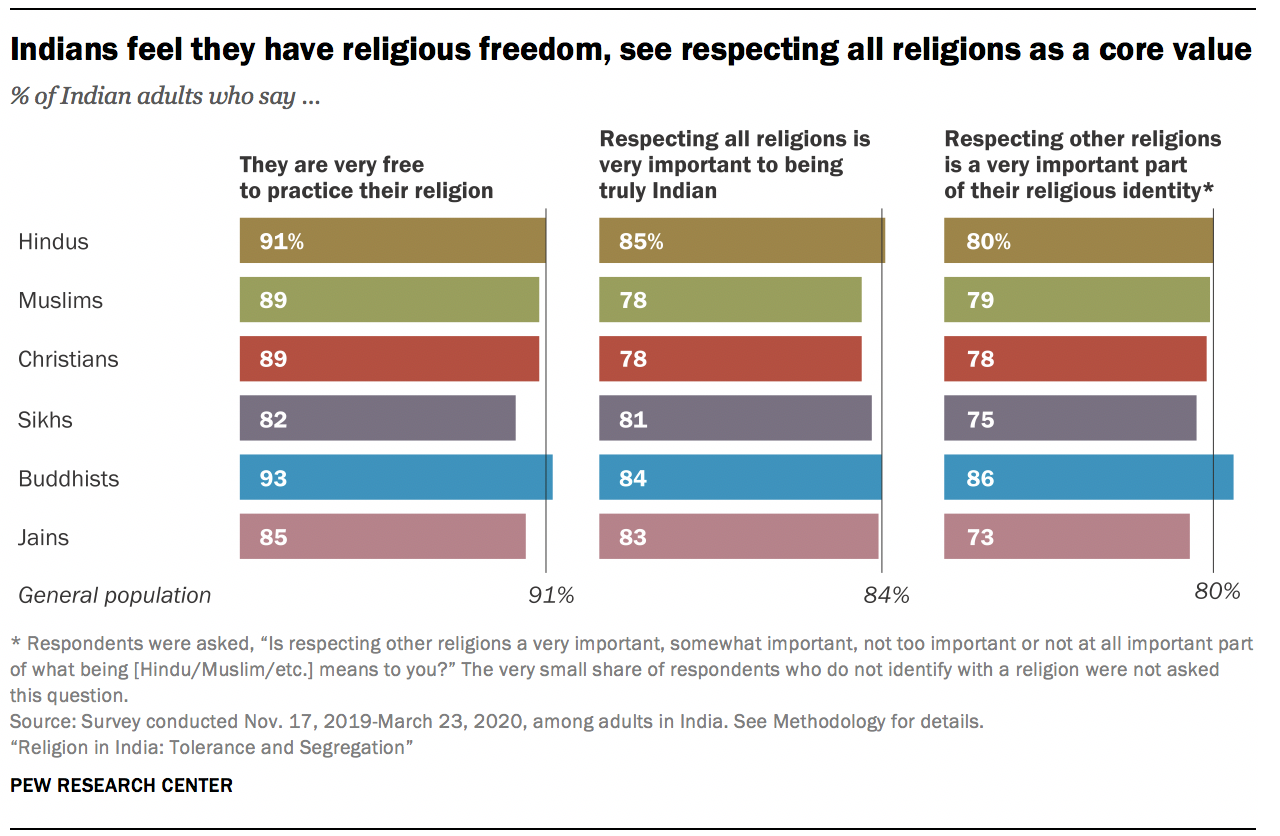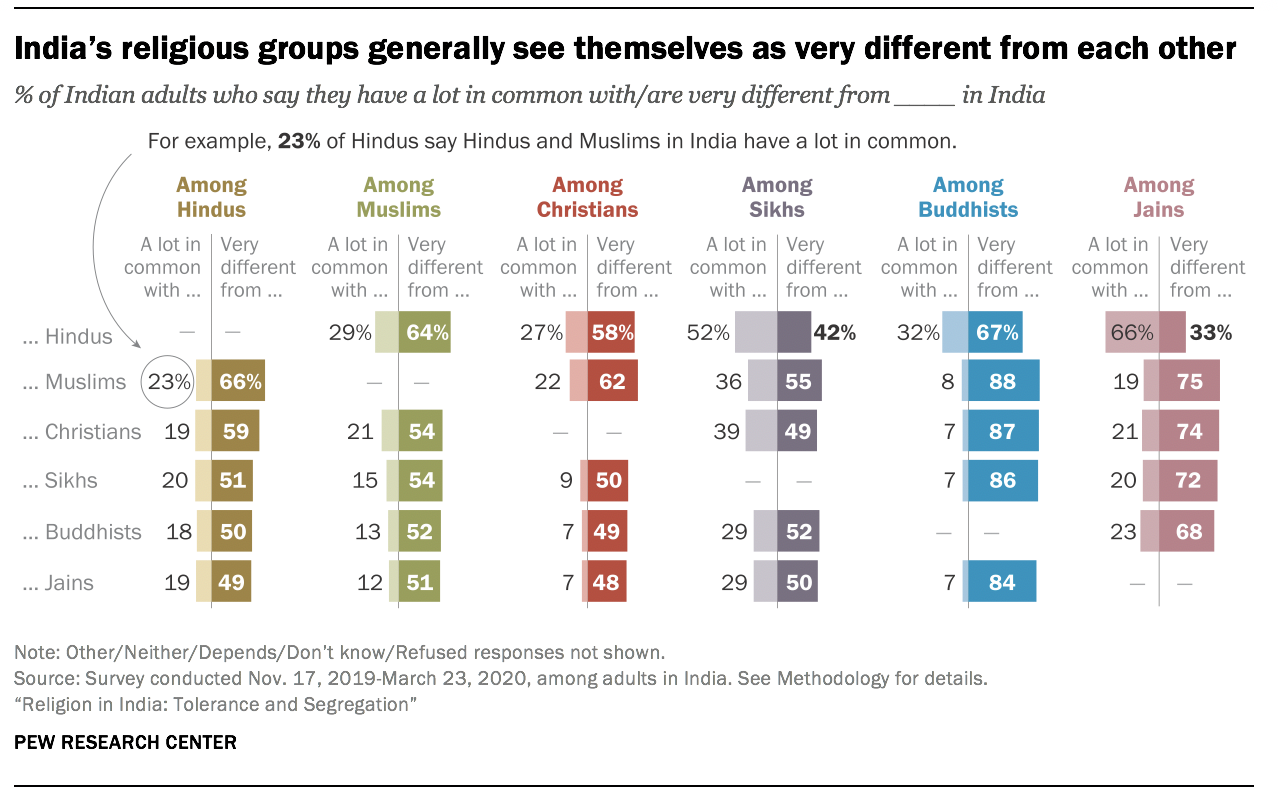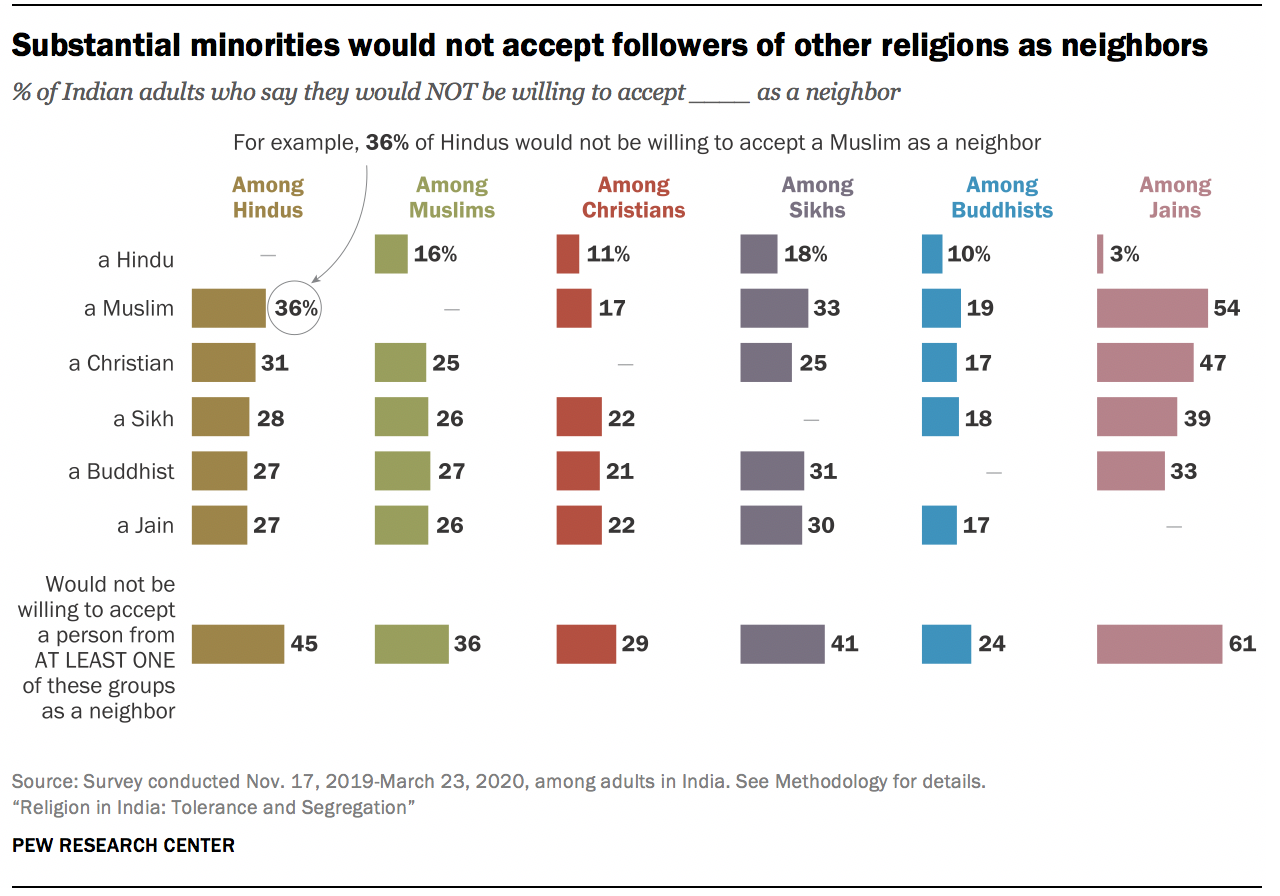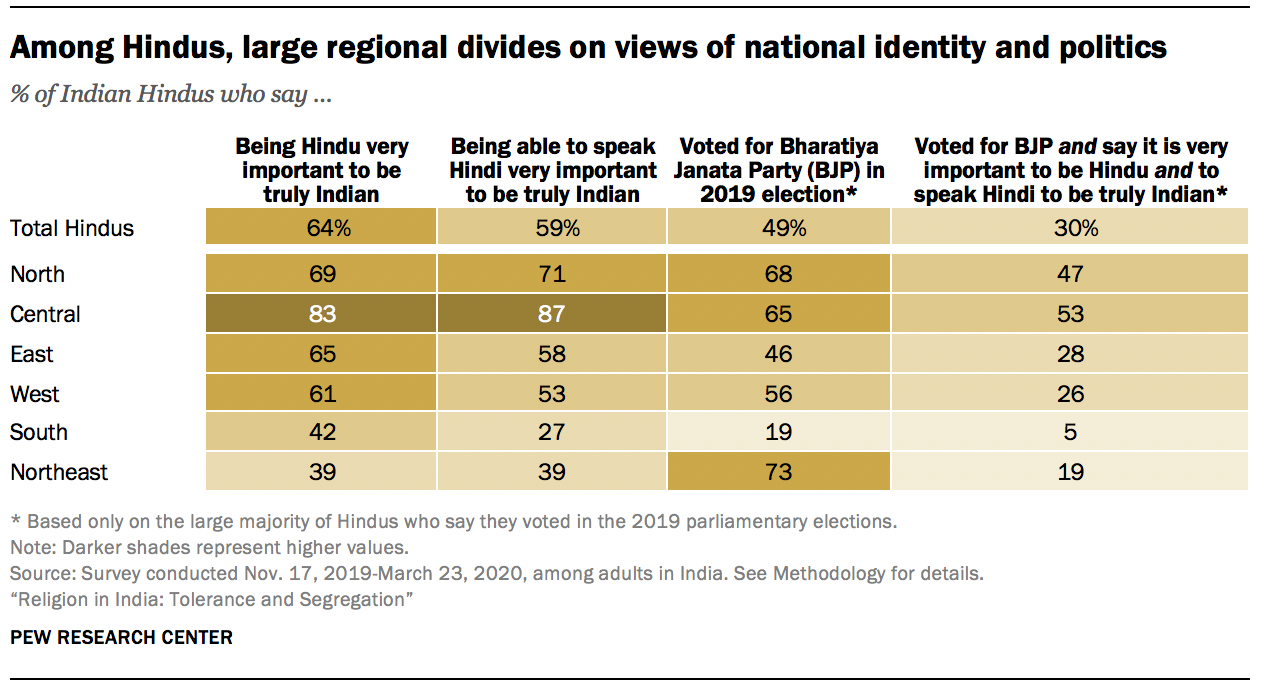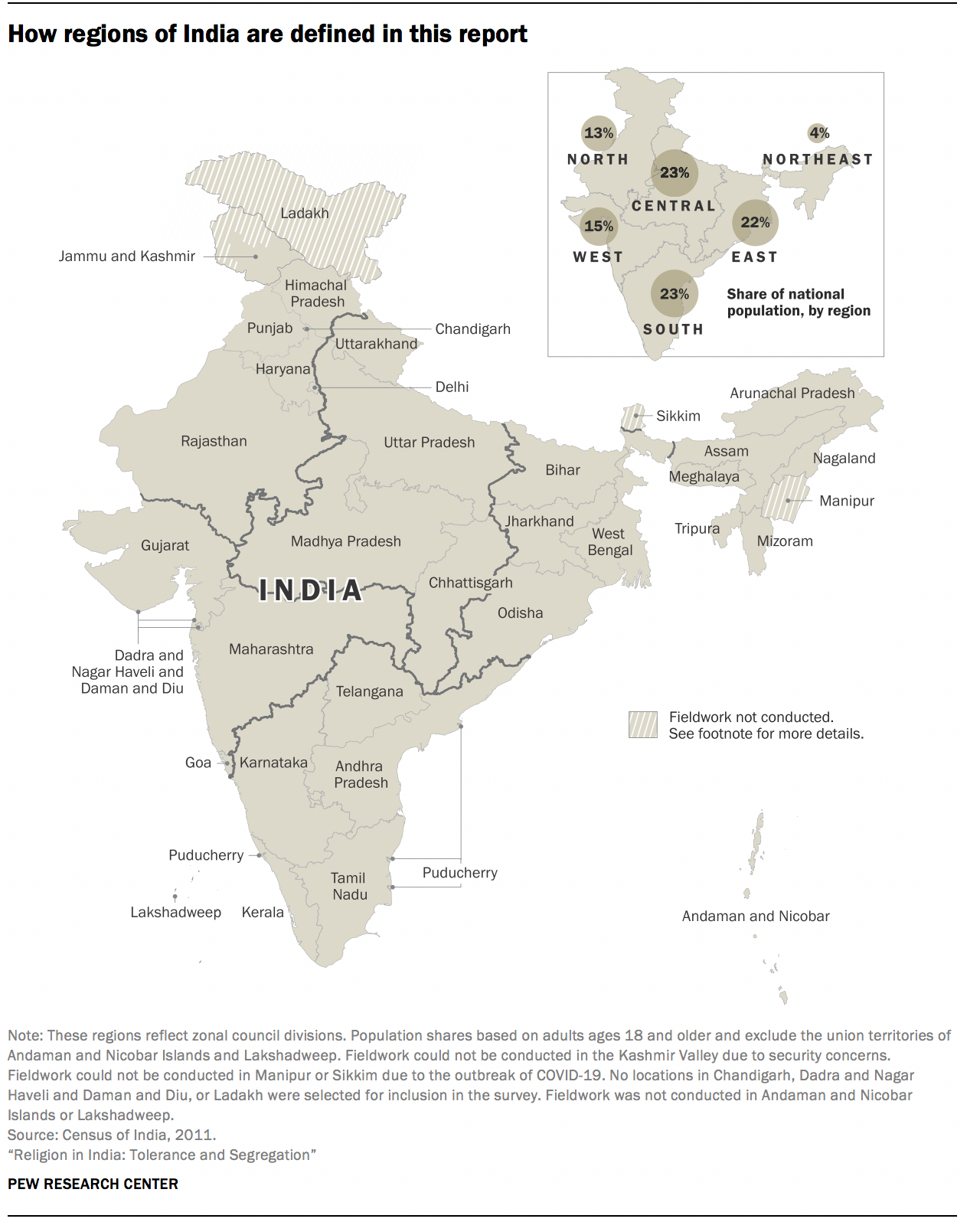
How we did this
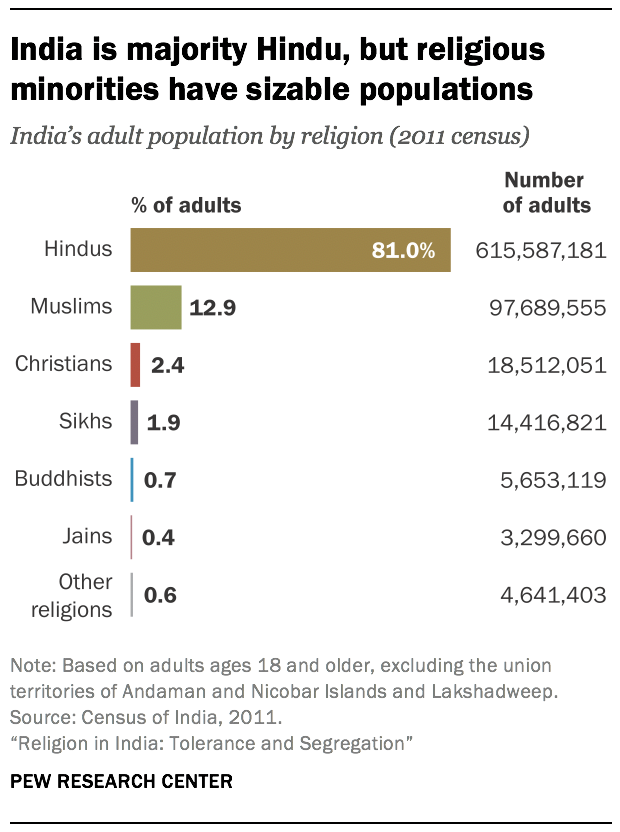 More than 70 years after India became free from colonial rule, Indians generally feel their country has lived up to one of its post-independence ideals: a society where followers of many religions can live and practice freely.
More than 70 years after India became free from colonial rule, Indians generally feel their country has lived up to one of its post-independence ideals: a society where followers of many religions can live and practice freely.
India’s massive population is diverse as well as devout. Not only do most of the world’s Hindus, Jains and Sikhs live in India, but it also is home to one of the world’s largest Muslim populations and to millions of Christians and Buddhists.
A major new Pew Research Center survey of religion across India, based on nearly 30,000 face-to-face interviews of adults conducted in 17 languages between late 2019 and early 2020 (before the COVID-19 pandemic), finds that Indians of all these religious backgrounds overwhelmingly say they are very free to practice their faiths.
Indians see religious tolerance as a central part of who they are as a nation. Across the major religious groups, most people say it is very important to respect all religions to be “truly Indian.” And tolerance is a religious as well as civic value: Indians are united in the view that respecting other religions is a very important part of what it means to be a member of their own religious community.
These shared values are accompanied by a number of beliefs that cross religious lines. Not only do a majority of Hindus in India (77%) believe in karma, but an identical percentage of Muslims do, too. A third of Christians in India (32%) – together with 81% of Hindus – say they believe in the purifying power of the Ganges River, a central belief in Hinduism. In Northern India, 12% of Hindus and 10% of Sikhs, along with 37% of Muslims, identity with Sufism, a mystical tradition most closely associated with Islam. And the vast majority of Indians of all major religious backgrounds say that respecting elders is very important to their faith.
Yet, despite sharing certain values and religious beliefs – as well as living in the same country, under the same constitution – members of India’s major religious communities often don’t feel they have much in common with one another. The majority of Hindus see themselves as very different from Muslims (66%), and most Muslims return the sentiment, saying they are very different from Hindus (64%). There are a few exceptions: Two-thirds of Jains and about half of Sikhs say they have a lot in common with Hindus. But generally, people in India’s major religious communities tend to see themselves as very different from others.
This perception of difference is reflected in traditions and habits that maintain the separation of India’s religious groups. For example, marriages across religious lines – and, relatedly, religious conversions – are exceedingly rare (see Chapter 3). Many Indians, across a range of religious groups, say it is very important to stop people in their community from marrying into other religious groups. Roughly two-thirds of Hindus in India want to prevent interreligious marriages of Hindu women (67%) or Hindu men (65%). Even larger shares of Muslims feel similarly: 80% say it is very important to stop Muslim women from marrying outside their religion, and 76% say it is very important to stop Muslim men from doing so.
Moreover, Indians generally stick to their own religious group when it comes to their friends. Hindus overwhelmingly say that most or all of their close friends are also Hindu. Of course, Hindus make up the majority of the population, and as a result of sheer numbers, may be more likely to interact with fellow Hindus than with people of other religions. But even among Sikhs and Jains, who each form a sliver of the national population, a large majority say their friends come mainly or entirely from their small religious community.
Fewer Indians go so far as to say that their neighborhoods should consist only of people from their own religious group. Still, many would prefer to keep people of certain religions out of their residential areas or villages. For example, many Hindus (45%) say they are fine with having neighbors of all other religions – be they Muslim, Christian, Sikh, Buddhist or Jain – but an identical share (45%) say they would not be willing to accept followers of at least one of these groups, including more than one-in-three Hindus (36%) who do not want a Muslim as a neighbor. Among Jains, a majority (61%) say they are unwilling to have neighbors from at least one of these groups, including 54% who would not accept a Muslim neighbor, although nearly all Jains (92%) say they would be willing to accept a Hindu neighbor.
Indians, then, simultaneously express enthusiasm for religious tolerance and a consistent preference for keeping their religious communities in segregated spheres – they live together separately. These two sentiments may seem paradoxical, but for many Indians they are not.
Indeed, many take both positions, saying it is important to be tolerant of others and expressing a desire to limit personal connections across religious lines. Indians who favor a religiously segregated society also overwhelmingly emphasize religious tolerance as a core value. For example, among Hindus who say it is very important to stop the interreligious marriage of Hindu women, 82% also say that respecting other religions is very important to what it means to be Hindu. This figure is nearly identical to the 85% who strongly value religious tolerance among those who are not at all concerned with stopping interreligious marriage.
In other words, Indians’ concept of religious tolerance does not necessarily involve the mixing of religious communities. While people in some countries may aspire to create a “melting pot” of different religious identities, many Indians seem to prefer a country more like a patchwork fabric, with clear lines between groups.
The dimensions of Hindu nationalism in India
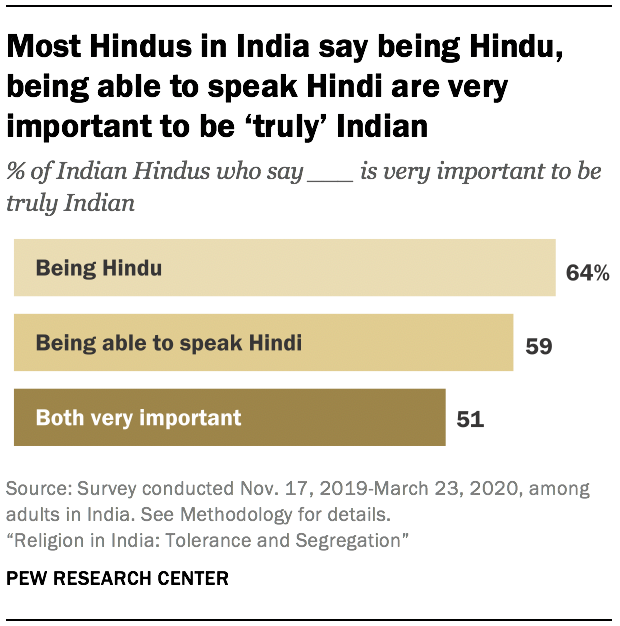 One of these religious fault lines – the relationship between India’s Hindu majority and the country’s smaller religious communities – has particular relevance in public life, especially in recent years under the ruling Bharatiya Janata Party (BJP). Led by Prime Minister Narendra Modi, the BJP is often described as promoting a Hindu nationalist ideology.
One of these religious fault lines – the relationship between India’s Hindu majority and the country’s smaller religious communities – has particular relevance in public life, especially in recent years under the ruling Bharatiya Janata Party (BJP). Led by Prime Minister Narendra Modi, the BJP is often described as promoting a Hindu nationalist ideology.
The survey finds that Hindus tend to see their religious identity and Indian national identity as closely intertwined: Nearly two-thirds of Hindus (64%) say it is very important to be Hindu to be “truly” Indian.
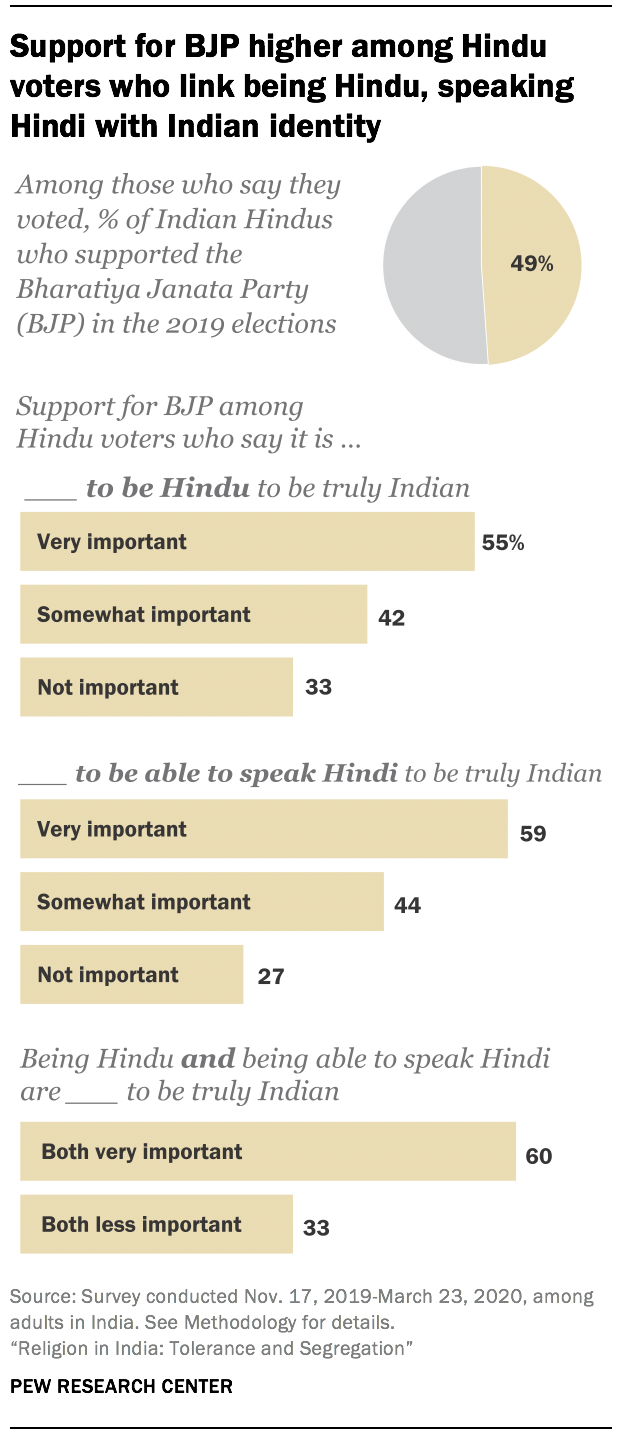 Most Hindus (59%) also link Indian identity with being able to speak Hindi – one of dozens of languages that are widely spoken in India. And these two dimensions of national identity – being able to speak Hindi and being a Hindu – are closely connected. Among Hindus who say it is very important to be Hindu to be truly Indian, fully 80% also say it is very important to speak Hindi to be truly Indian.
Most Hindus (59%) also link Indian identity with being able to speak Hindi – one of dozens of languages that are widely spoken in India. And these two dimensions of national identity – being able to speak Hindi and being a Hindu – are closely connected. Among Hindus who say it is very important to be Hindu to be truly Indian, fully 80% also say it is very important to speak Hindi to be truly Indian.
The BJP’s appeal is greater among Hindus who closely associate their religious identity and the Hindi language with being “truly Indian.” In the 2019 national elections, 60% of Hindu voters who think it is very important to be Hindu and to speak Hindi to be truly Indian cast their vote for the BJP, compared with only a third among Hindu voters who feel less strongly about both these aspects of national identity.
Overall, among those who voted in the 2019 elections, three-in-ten Hindus take all three positions: saying it is very important to be Hindu to be truly Indian; saying the same about speaking Hindi; and casting their ballot for the BJP.
These views are considerably more common among Hindus in the largely Hindi-speaking Northern and Central regions of the country, where roughly half of all Hindu voters fall into this category, compared with just 5% in the South.
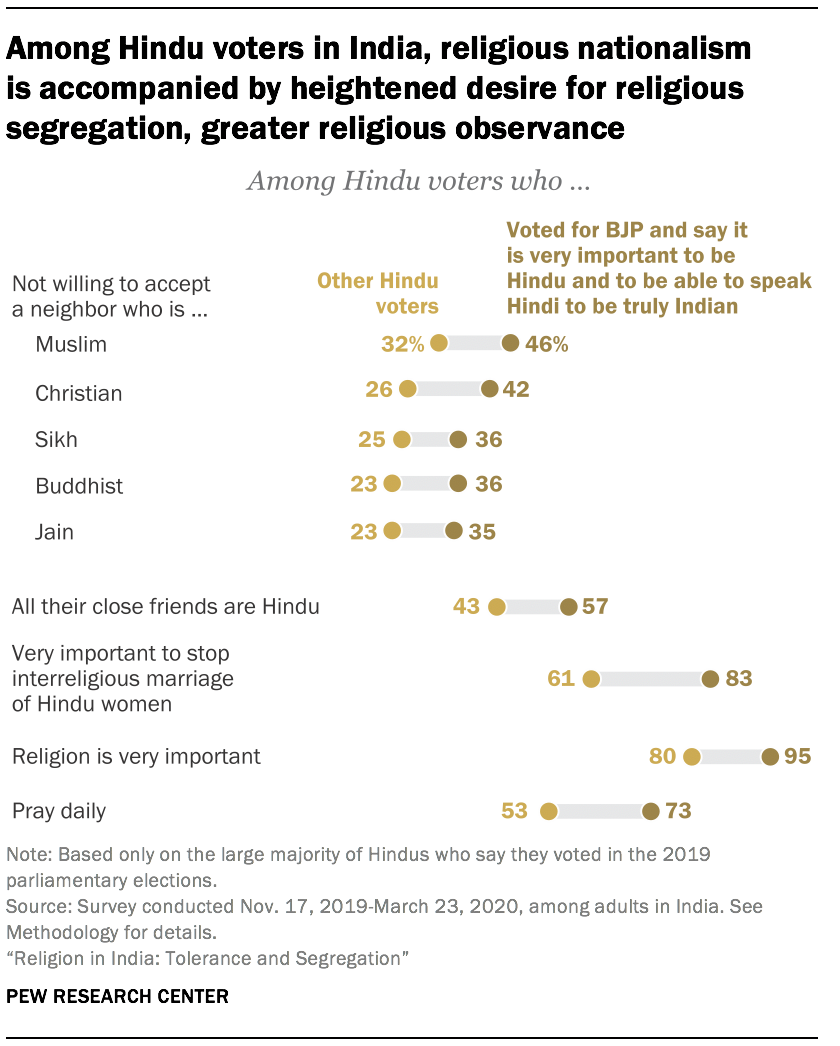 Whether Hindus who meet all three of these criteria qualify as “Hindu nationalists” may be debated, but they do express a heightened desire for maintaining clear lines between Hindus and other religious groups when it comes to whom they marry, who their friends are and whom they live among. For example, among Hindu BJP voters who link national identity with both religion and language, 83% say it is very important to stop Hindu women from marrying into another religion, compared with 61% among other Hindu voters.
Whether Hindus who meet all three of these criteria qualify as “Hindu nationalists” may be debated, but they do express a heightened desire for maintaining clear lines between Hindus and other religious groups when it comes to whom they marry, who their friends are and whom they live among. For example, among Hindu BJP voters who link national identity with both religion and language, 83% say it is very important to stop Hindu women from marrying into another religion, compared with 61% among other Hindu voters.
This group also tends to be more religiously observant: 95% say religion is very important in their lives, and roughly three-quarters say they pray daily (73%). By comparison, among other Hindu voters, a smaller majority (80%) say religion is very important in their lives, and about half (53%) pray daily.
Even though Hindu BJP voters who link national identity with religion and language are more inclined to support a religiously segregated India, they also are more likely than other Hindu voters to express positive opinions about India’s religious diversity. Nearly two-thirds (65%) of this group – Hindus who say that being a Hindu and being able to speak Hindi are very important to be truly Indian and who voted for the BJP in 2019 – say religious diversity benefits India, compared with about half (47%) of other Hindu voters.
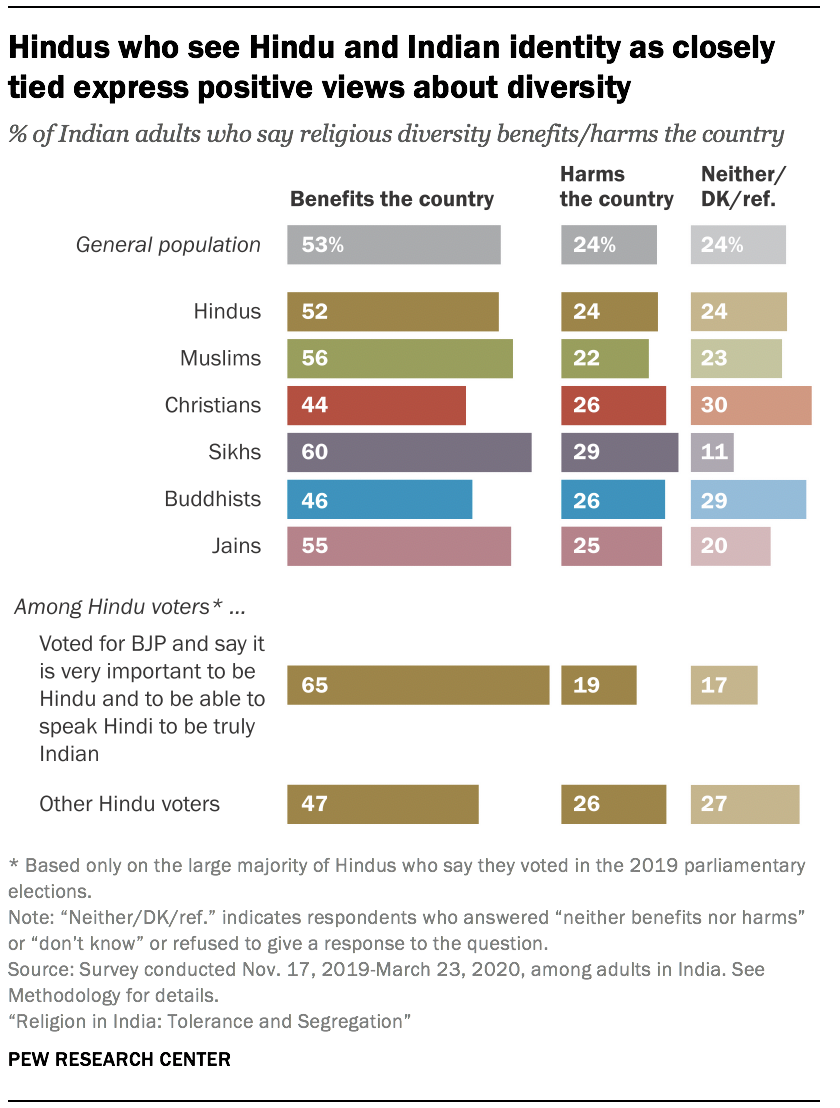 This finding suggests that for many Hindus, there is no contradiction between valuing religious diversity (at least in principle) and feeling that Hindus are somehow more authentically Indian than fellow citizens who follow other religions.
This finding suggests that for many Hindus, there is no contradiction between valuing religious diversity (at least in principle) and feeling that Hindus are somehow more authentically Indian than fellow citizens who follow other religions.
Among Indians overall, there is no overwhelming consensus on the benefits of religious diversity. On balance, more Indians see diversity as a benefit than view it as a liability for their country: Roughly half (53%) of Indian adults say India’s religious diversity benefits the country, while about a quarter (24%) see diversity as harmful, with similar figures among both Hindus and Muslims. But 24% of Indians do not take a clear position either way – they say diversity neither benefits nor harms the country, or they decline to answer the question. (See Chapter 2 for a discussion of attitudes toward diversity.)
India’s Muslims express pride in being Indian while identifying communal tensions, desiring segregation
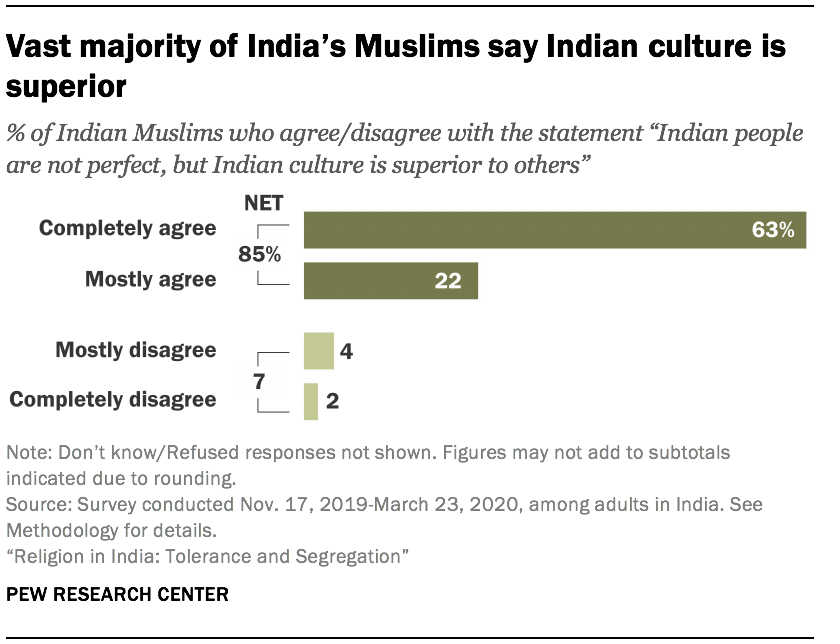 India’s Muslim community, the second-largest religious group in the country, historically has had a complicated relationship with the Hindu majority. The two communities generally have lived peacefully side by side for centuries, but their shared history also is checkered by civil unrest and violence. Most recently, while the survey was being conducted, demonstrations broke out in parts of New Delhi and elsewhere over the government’s new citizenship law, which creates an expedited path to citizenship for immigrants from some neighboring countries – but not Muslims.
India’s Muslim community, the second-largest religious group in the country, historically has had a complicated relationship with the Hindu majority. The two communities generally have lived peacefully side by side for centuries, but their shared history also is checkered by civil unrest and violence. Most recently, while the survey was being conducted, demonstrations broke out in parts of New Delhi and elsewhere over the government’s new citizenship law, which creates an expedited path to citizenship for immigrants from some neighboring countries – but not Muslims.
Today, India’s Muslims almost unanimously say they are very proud to be Indian (95%), and they express great enthusiasm for Indian culture: 85% agree with the statement that “Indian people are not perfect, but Indian culture is superior to others.”
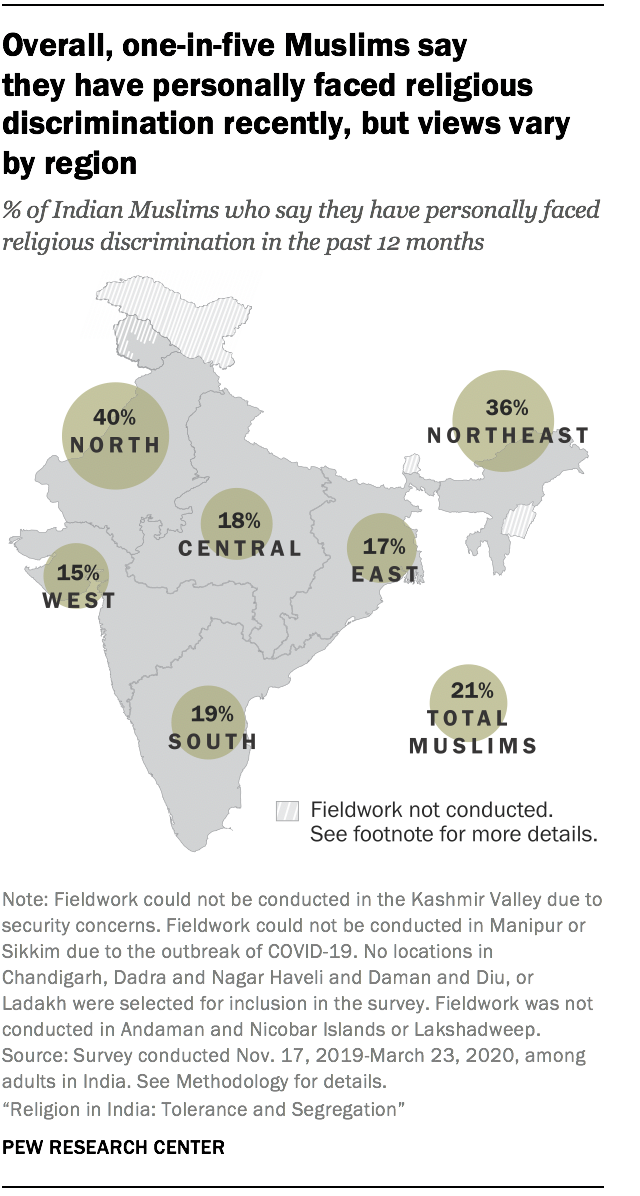 Relatively few Muslims say their community faces “a lot” of discrimination in India (24%). In fact, the share of Muslims who see widespread discrimination against their community is similar to the share of Hindus who say Hindus face widespread religious discrimination in India (21%). (See Chapter 1 for a discussion of attitudes on religious discrimination.)
Relatively few Muslims say their community faces “a lot” of discrimination in India (24%). In fact, the share of Muslims who see widespread discrimination against their community is similar to the share of Hindus who say Hindus face widespread religious discrimination in India (21%). (See Chapter 1 for a discussion of attitudes on religious discrimination.)
But personal experiences with discrimination among Muslims vary quite a bit regionally. Among Muslims in the North, 40% say they personally have faced religious discrimination in the last 12 months – much higher levels than reported in most other regions.
In addition, most Muslims across the country (65%), along with an identical share of Hindus (65%), see communal violence as a very big national problem. (See Chapter 1 for a discussion of Indians’ attitudes toward national problems.)
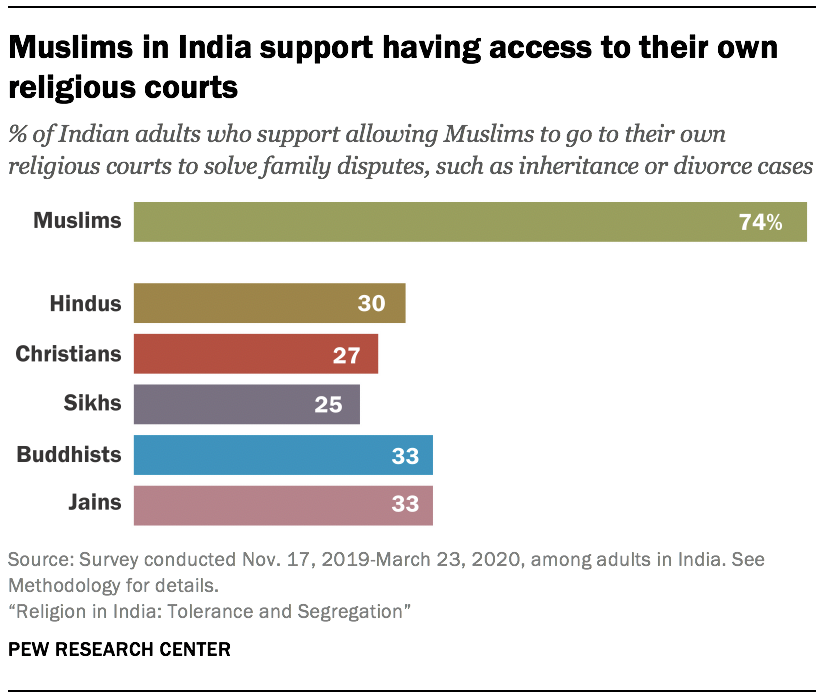 Like Hindus, Muslims prefer to live religiously segregated lives – not just when it comes to marriage and friendships, but also in some elements of public life. In particular, three-quarters of Muslims in India (74%) support having access to the existing system of Islamic courts, which handle family disputes (such as inheritance or divorce cases), in addition to the secular court system.
Like Hindus, Muslims prefer to live religiously segregated lives – not just when it comes to marriage and friendships, but also in some elements of public life. In particular, three-quarters of Muslims in India (74%) support having access to the existing system of Islamic courts, which handle family disputes (such as inheritance or divorce cases), in addition to the secular court system.
Muslims’ desire for religious segregation does not preclude tolerance of other groups – again similar to the pattern seen among Hindus. Indeed, a majority of Muslims who favor separate religious courts for their community say religious diversity benefits India (59%), compared with somewhat fewer of those who oppose religious courts for Muslims (50%).
This article first appeared on pewforum.org


